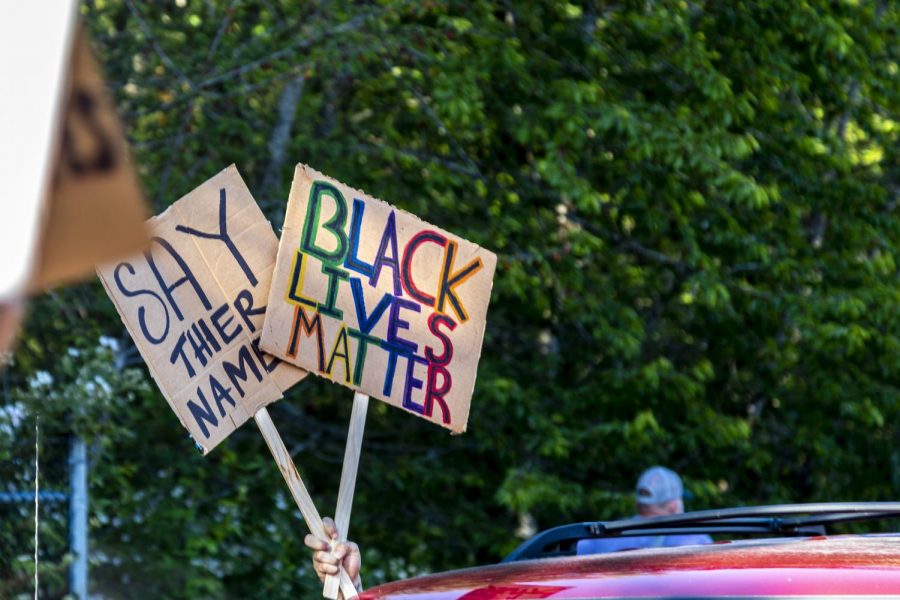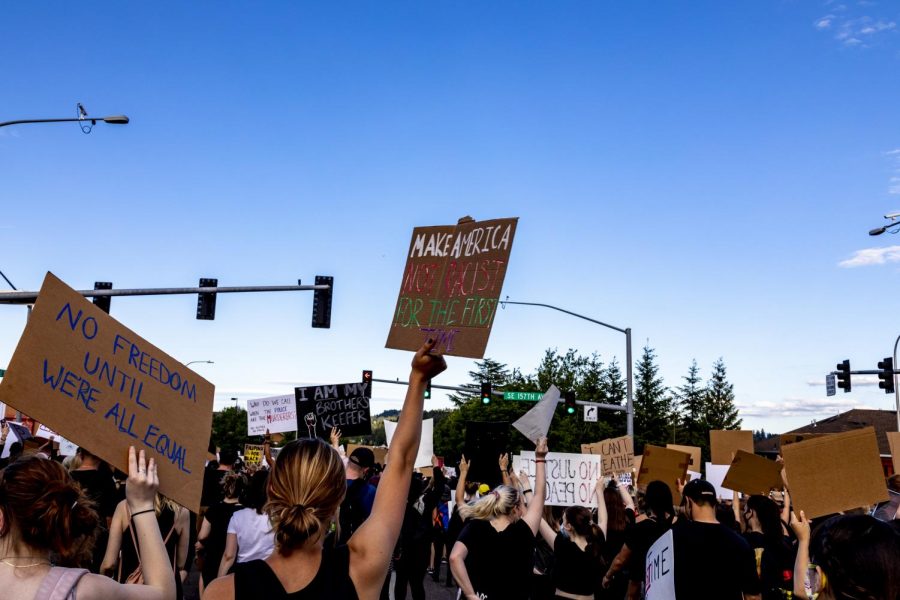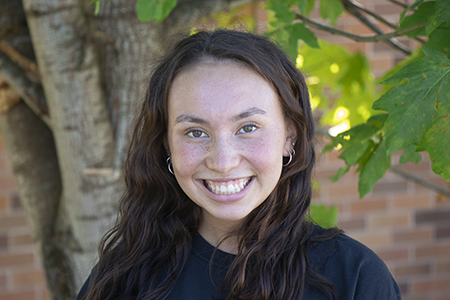Students and Staff Express “Rage” and “Sadness” Following the Killing of George Floyd, Encourage Others to Act Against Racism
As protests continue to grow throughout the country, some La Salle students have decided to take part to act against racism and police brutality.
June 3, 2020
In the wake of the killing of George Floyd last week, peaceful protests, civil unrest, police brutality, and looting have erupted throughout the nation.
La Salle students are among those taking part in the numerous demonstrations occurring in the Portland area, with many more sharing their outrage online and working to process the anger and sorrow of yet another black person’s death at the hands of the police.
“Right now is a time to come together as one,” freshman Maia Gutmann said. “George Floyd is only one of the many that have been victims of police brutality, and it’s time to stand up for what you believe in and stand up in support of those struggling. Speak your truth and fight against the injustice that has been present for far too long.”
Gutmann has been attending the largely peaceful protests for the Black Lives Matter movement occurring in downtown Portland, along with several other students from within the La Salle community.
“I have been attending the peaceful protests, despite videos circulating online of the police abusing their power and tear gassing and shooting peaceful protesters with rubber pellets,” senior Summer Tran said. “At first I thought to myself, ‘what if I get hurt or arrested,’ but then I remembered that my black friends have to live with the fear of being killed and being shot with real bullets every single day… The injustice absolutely has to end. There is power in numbers, and the only way change will ever occur is if we come together and fight against the injustice and police brutality.”
While Floyd’s death has spurred immense unrest in cities all across the nation, his killing is not an isolated incident.
Rather, Floyd is one of many black people whose lives were lost to police brutality and systemic racism. In 2019 alone, 236 black people were shot and killed by the police. Black men are 2.5 times more likely to be killed by police than white men, and for all racial and ethnic groups, police use of force is the sixth-leading cause of death among men from the ages of 25 to 29.
“There were numerous black men and women [whose] lives were ending through police brutality prior to George Floyd, but this was the tip of the iceberg for many,” senior Vanessa Gashongore said. “I believe the gruesome video opened many eyes of those who were blind.”
Gashongore expressed her outrage with the injustice and racism that still runs rampant throughout the United States.
“I am tired,” she said. “I am angry. I am so tired of being angry. How many black lives have to be taken for things to change in this country? How come we are still fighting for rights that were supposed to have been given to us? Why are people still racist? I ask myself this question a lot.”
Several other members of the La Salle community expressed anger and sadness regarding the death of Floyd and the continuation of years of systemic racism, which, religious studies teacher and equity team member Mr. Tom McLaughlin said, is “not only overt racism, but… more subtle racist systems, policies, cultural elements, and personal thoughts, beliefs, and practices.”
Students expressed a range of strong emotions following Floyd’s death — senior Maddie Hull said that she feels “so incredibly sad,” and senior Amira Tripp-Folsom said that she has felt more “angry” in recent days than feeling disappointment or sadness.
“When I heard about the murder, all I really felt was anger,” Tripp-Folsom said. “At this point, I’m starting to get desensitized to it… because it’s just so common… I’ve gotten past the point of disappointment and sadness. And all that’s really left is just anger and rage.”
Mr. McLoughlin, also known as Mr. Mac, said that he has also been feeling rage “towards the police officer who murdered George,” he said. “Toward his fellow officers who participated in the murder; toward the president and other (predominantly white) political leaders who have failed to focus on the legitimate reasons that many people are protesting peacefully, and a relative few are acting out violently; and toward any white person who is not outraged by this crime, just the latest in a 400-year-old chain of crimes against black people.”
In addition to this rage, Mr. Mac said that he has also been experiencing “profound sadness, even to the point of despair, that the collective efforts of generations of activists have not changed enough hearts and minds to make this crime impossible in our land. I have felt disgust at people who stay silent in the face of such hatred.”
Art teacher and equity team member Ms. Cha Asokan (commonly called Ms. Cha by students) said that she has similarly experienced both sadness and anger in recent days.
“Black people are getting murdered by people who are supposed to protect them,” she said. “My heart hurts, my mind is angry, and there is fear that it will continue. But as an advocate for change, I want to hold onto positivity, and the hope that protesting, and acting non-violently, like Dr. King, Gandhi, Jesus, and many more did, will be the answer.”
Tripp-Folsom expressed frustration with some of the responses to the Black Lives Matter movement and the protests that have followed the death of George Floyd. The movement “is centered around black people saying, ‘stop murdering us,’” she said. “That’s literally all it is.” Still, she said, “the police come in full riot gear” and sometimes react in violence.
Tripp-Folsom noted how earlier in April, when white protesters had gathered in several different cities and on the steps of state capitols, often carrying weapons, to demonstrate their disapproval of stay-at-home orders, police had not reacted violently or shown up in riot gear.
In many cases, protests have become chaotic and violent — buildings have been set aflame, police cars have been damaged, and businesses have been looted. Because of this looting and rioting, some people have spoken out against the protesting, which frustrates Tripp-Folsom because “people are more concerned about property damage and profit than they are about human life,” she said.
“At this point, we’ve tried everything,” she said. “They got mad when we were kneeling during the national anthem, they get mad when we wear Black Lives Matter t-shirts… The president literally said that he doesn’t support what we’re fighting for, he cares more about property and merchandise than he does about what we’re fighting for. And at this point, I think a lot of people have lost faith in the justice system, in the police, in our government, and they don’t have anything left to lose, so we’re going to try and take our freedom by any means necessary. And I think people are starting to actually witness how awful the police really are.”
In an email sent to La Salle students and families on Monday, June 1, President and Principal Mr. Andrew Kuffner wrote that through our Lasallian mission, the school community is called to take action to dismantle the pattern of racism throughout the country and within communities.
“We raise the voice of our mission and the voices of those silenced and marginalized in a clear and comprehensive chorus to unequivocally state: Racism is an evil cancer, and we must come together to stop its spread and treat what it has infected,” he said.
Mr. Kuffner said that in response to the current situation, the staff equity team and the entire faculty will be “inviting students to participate in dialogue, critical thinking, praying, listening, sharing, and reflecting as a way to support them as they process what they are witnessing and feeling.”
Gashongore said that she wanted to “stress the sadness” that she felt that the school did not address the issue to the community as a whole until a week after the incident. “This isn’t a one day thing,” she said. “We want justice for all those [whose] lives were taken because of police brutality. All lives don’t matter [until] black lives matter.”

Some people who oppose the Black Lives Matter movement maintain that rather than advocating black lives matter, it should be promoted that “all lives matter.” However, Mr. Mac echoed Gashongore’s belief that all lives do not matter until black lives do.
“The BLM agrees that all lives matter,” he said. “But in this moment, we can clearly see that for some people, black and brown lives matter less than white lives. They might not say so in words, but their actions say it without stuttering. And so, until all people show that all lives matter, it is imperative that we pause to highlight that Black Lives Matter.”
Ms. Cha said that she will stand for this movement and for any of her students who are fighting against injustice and systemic racism. “I want my students of color to know that I am here for them,” she said. “That I will go to bat for them, that I will stand by them, and that I will fight in the ways that are productive and positive to make change, even if it is difficult. I hope for peaceful times ahead, but we have a lot of work to do. Black lives matter. I cannot say it enough. Black lives matter.”
Mr. Mac said that it is especially important for white people to use their privilege in support of this movement. “It’s essential that white people be seen front and center in actions of nonviolent protest, that they’re seen in photos and video on the front lines of peaceful actions for equity and inclusion,” he said. “This is necessary because Americans of all colors live in a dominant white culture, and white people hold the vast majority of positions of power and privilege. It’s white people who have the power and possibility to make room at the table for women and men of all races, ethnicities, sexual orientations, faith perspectives, socio-economic situations, and gender-identities.”
“This is the only way that we will ever know true peace and harmony, that we will ever fully know ourselves,” he said. “Without the myriad voices of our humanity, without justice and love for all, every individual human will be incomplete.”
Senior Liam Rinehart, who has attended many BLM protests for years and several within the past week, also emphasized the importance of white participation in these protests.
“I would say it’s important for anyone, but especially white people to show solidarity,” he said. “What I’ve noticed from being down there is that the police can split up small groups of people, but when there’s thousands of people they can’t do anything.”
Gashongore encouraged her classmates and fellow members of the La Salle community to “use your voice and your privilege,” she said. “Don’t be silent… Challenge yourself and get outside of [your] comfort zone because this is truly the only way to grow.”
Tripp-Folsom said that while some people deny the existence and the prevalence of white privilege, it certainly does exist.
“White privilege is not saying that you won’t have any struggles in your life because you’re white, but it’s the fact that your white skin and your white race is never going to be one of those struggles for you,” she said. “You’re never going to be discriminated against, systemically, because of your race the way that black people have, the way that Latinx and Asian people and Native people have been discriminated against, simply because of their race.”
Gashongore said that “there are still so many out [there] who are fearful of acknowledging their privilege,” but that “white privilege shouldn’t be something one is ashamed of but rather something one uses to help others who don’t have it. Acknowledging your privilege and still deciding to help others is a great thing.”
Though George Floyd is just one name among many others whose lives were taken due to police brutality, Rinehart and others said that this death and the subsequent reaction feels different. Perhaps, Rinehart said, this is because of everything else that is currently going on in the world; as the global coronavirus pandemic takes hold of and changes the course of this year for many Americans, maybe this unusual health crisis combined with the video documentation of police brutality in numerous cities has created the uniquely widespread and lasting unrest that has struck virtually every major city in the United States over the course of this past week.
“I think the fact that the pandemic — people are out of work, low on money, uncertain about their future, just angry — it just created a perfect storm for something like this to happen,” Rinehart said. “And the response has just been so big, and it’s been so much bigger than anything I’ve ever seen.”
Or maybe, Mr. Mac said, the major factor that set this incident apart from countless others is the viral videos of the killing of George Floyd, in which former officer Derek Chauvin is seen pushing his knee into Floyd’s neck for eight minutes and 46 seconds.
“Anyone who has watched the various videos of the lynching of George Floyd cannot deny the inhumanity of this white police officer and his colleagues to another human being,” Mr. Mac said. “What the longest video — recorded by a teenage girl — also shows is that numerous people of various races challenged the authorities. This time, they could not save George Floyd. But they have inspired me to prepare myself to challenge any injustice I encounter. Those few people leave me with a ray of hope that love and justice are stronger than violence and ignorance.”
Students who have attended protests in recent days commented on the profundity and power of so many people gathering together in support of a pivotal movement.
“I have seen the passion and determination of those marching and chanting and have had the opportunity to join them,” Gutmann said. “I have chosen the side I want to be on and have used my privilege to speak out and speak in support of those who are unable to have their voice heard.”
Rinehart described the experience of protesting with the mass crowds that have been showing up since the death of Floyd as “powerful” and said that “this will be looked at as the biggest [protest for racial equality] of our generation. It far outweighs the L.A. race riots, it far outweighs any sort of protest or movement I’ve ever seen in my life.”
Tripp-Folsom encourages others to take part in taking action to defund the police.
“The police are never going to improve the way that we need them to, and that’s been so clear in the way that they’ve responded to these protests,” she said. “The Portland Police literally took a knee with protesters and maybe 20 minutes later threw tear gas on them.”
She said that the police “don’t need to be as well funded as they are,” and that more funds should go to other areas of need, and that we should start to look to other ways to decrease crime and de-escalate situations that don’t involve police force.
“Everybody sees how well prepared they were with riot gear and tear gas and rubber bullets and flashbangs [at the protests],” she said. “But where was that preparation when a freaking pandemic hit our country? We were so underprepared.”
As thousands of Americans continue to take to the streets each day for over a week after the death of Floyd, several members of the La Salle community that The Falconer spoke with emphasized that there is strength in numbers and advocated that each individual should take action to stand against the injustice that has simmered above and below the surface of everyday American life for hundreds of years.
“At this point, if you are willingly not participating in supporting the movement, there’s something deeply wrong with you,” Tripp-Folsom said. “If you’re not doing everything that you can, you are a part of the problem and you are what we are fighting against, and you should be afraid because we’re not going to stop.”






Cindy Garcia • Jun 7, 2020 at 5:36 pm
Excellent job Maddie. You did a very thoughtful article, giving a voice to an issue that needs to be talked about within all communities. Thank you.
Tom McLaughlin • Jun 6, 2020 at 10:05 am
Great job writing this, Maddie. It was a difficult piece because you had to weave so many voices together into a cohesive format. You did it. And thank you for writing this. It’s one of the most important articles to appear on the outstanding Falconer this year.